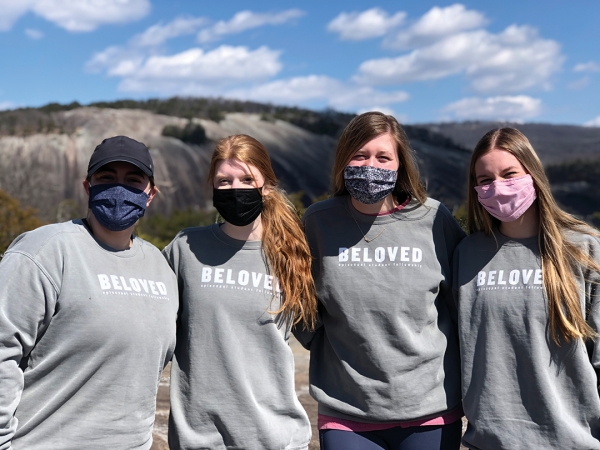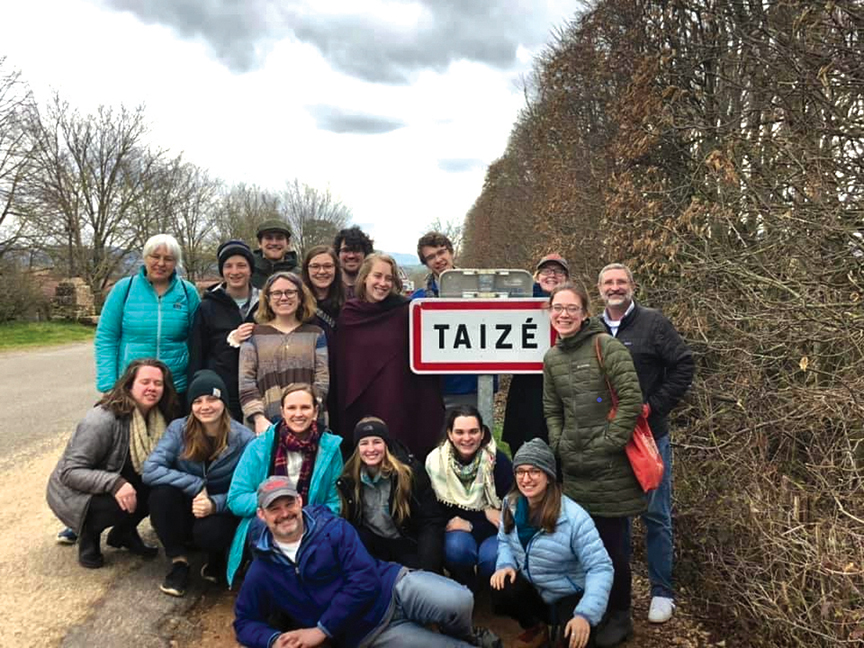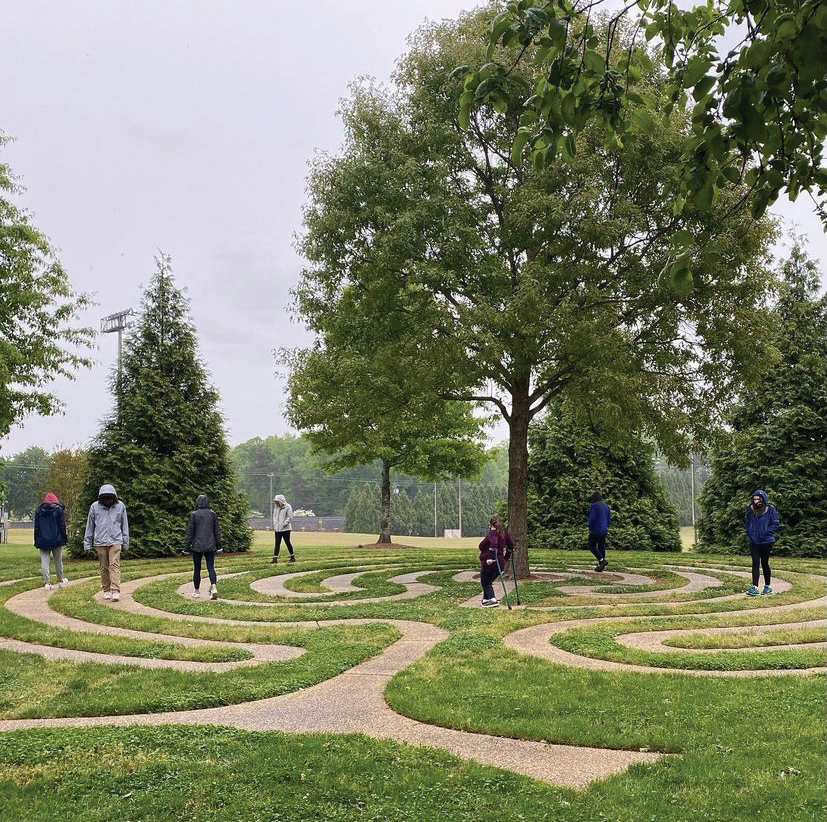Disciple: Walking Through Change

Campus ministries help launch faithful young adults into a tumultuous world
While all campus ministries are supported, in part, by the annual diocesan budget, the leader of each individual ministry makes decisions about how best to reach students, so each ministry is tailored to a specific context. The Rev. Mary Cat Young, chaplain at UNC-Chapel Hill, encapsulates the diversity of ministries: “One might be a solo chaplain with a leaky roof and their own copier contract to pay for. Others have a parish-based ministry that has eager (but aging) volunteers built in—with a need for fresh energy and ideas to offer. Others work with an ecumenical model that means applying for funds from and answering to several different denominational expectations of reporting, grant writing and the added work of bridging the needs of students across different traditions.”
What follows are excerpts from interviews with leaders at each of the 10 campus ministries, representing five clusters of colleges and universities, four single-campus ministries and Saint Mary’s School, a private all-girls Episcopal high school in Raleigh.
[Image: Students at Episcopal Student Fellowship at Wake. Photo courtesy of the Rev. James Franklin]
We offer a Eucharist each Sunday (and a dinner, when not in a pandemic mode), as well as a Compline service on Tuesdays. Additionally, we do service work together, including mission trips. We typically go on two retreats per (non-pandemic) year. We reach out to students and young adults, offering a community that is Christ-centered, rooted in the Eucharist, and is a sanctuary where people can be honest and vulnerable in a high-pressure university environment.
Describe the population your ministry serves.
The ministry primarily serves college students, both graduate and undergraduate, but also young adults in Durham. Additionally, members of our sponsoring parishes (St. Luke’s, St. Philip’s, St. Titus’, St. Stephen’s and St. Joseph’s) embrace the ministry, providing an important intergenerationality.
How has campus ministry changed since you started?
The urgency of dismantling racism and of navigating climate change has gotten much more pressing in my time. Neither is regarded as a casual concern by the students I serve, and seriousness about these issues is a baseline requirement for many of them as they look for communities to join.
Please stop reading media generalizations about younger generations. They do not reflect the reality of the incredible people we journey with. Come to a service sometime and meet people. Our young adults are incredible and inspiring. I gain hope from them, and I meet Christ in them all the time.
ESF has a fantastic student vestry that leads, plans and ultimately are the ones to reach students and invite them to a community of belonging. Nearly every student you talk with has a story about who invited them. We have two student chaplains who are trained in basic pastoral care, function as peer-to-peer ministers on campus and help organize Bible studies. COVID-19 provided an opportunity to focus on small groups and Bible study in the absence of large group activities; now, with the return of campus gatherings, we want to keep this rhythm and structure.
What concerns and questions do you hear most often?
The first half of life is full of questions about identity, belief systems and vocation. Students ask the best questions, and we encourage it! To wrestle and doubt is faithful. (A student asked me this morning about consubstantiation!) Students often ask about how to read scripture, interpret it, and reconcile its many and perceived inconsistencies. They ask about suffering. They ask about sex and relationships. They ask about sin and hell. I have deeper conversations about faith and spirituality in two weeks on campus than I did in two years of parish ministry!
Stop calling campus ministry “youth ministry;” it is not. They are not youths. They are young adults. Also, campus ministers work freaking hard. Most of us do not have admin support. We put in 50-to-70-hour weeks during the school year. We’re scrappy and missional, often showing up in shared spaces and “making space” for ministry wherever we can.
We reach students through regular worship on Sundays, weekly Bible studies, an LGBTQ+ reflection group and a mindfulness/meditation class aimed at reducing stress.
What concerns and questions do you hear most often?
Apart from the usual small questions (like “What is God?” or “What happens when you die?”), we get a lot of concerns about the present and the future. How does one strive for a better world? What do spiritual practices do to inspire people to higher standards in their treatment of one another and the environment? How can my faith help me not be so anxious all the time?
Folks are always rotating out, so maintaining a firm, constant community can be a bit of a challenge, especially in uncertain times. Students don’t often have a lot of money, so costs for our ministry have to come from outside of it. If you aren’t giving to a campus ministry in your area or at least the one nearest to you, please consider doing so! It is always a joy to watch a young adult find peace in our faith and inspiration in scripture, from Christ or from the example of the saints. Their questions keep us fresh and on our toes and are genuinely good for the Church.
Anything else you want to tell me?
It would be fantastic if folks in youth programs at congregations would speak about college spiritual life ahead of time. Presenting spiritual life as something that continues with campus ministry would help establish and maintain a good cycle for continual spiritual growth as our young people move into new phases of life.
Our ministry is housed at The Chapel of the Cross, Chapel Hill. Students attend worship services, acolyte, sing in the choir and volunteer in a variety of ways. Our student chaplains run programs for our weekly meetup on Tuesday nights, and parish volunteers provide meals and are dinner companions, conversationalists and great listeners for our attendees. This week on campus, we are passing out compostable utensils with an invitation to join us for dinner. We have a speaker series, and we invite different groups to partner with us. We also engage with our fellow campus ministry groups for service and learning opportunities.
What concerns and questions do you hear most often?
Is this a community I will be welcome in? Safe in? Will I be able to learn and grow and make mistakes, and not be judged? Will I be held to an impossible standard? Can I ask questions? Can you teach me how to pray?
How has campus ministry changed since you started?
There are many different contexts, dynamics and demands at work in our various settings. And yet, we navigate all of that so we can be faithful companions to students during a time of uncertainty, discerning and development into adulthood. With traditional students, we have the chance to walk with someone from age 18 to 22 and launch in their first career steps, embedding in them a faith practice and faithful witness to God at work in their lives, their calling, their budding relationships, their self-discovery. Some students we see once as a first year or in the last semester before they graduate. And some we will be a touchstone for as we hold a space they can walk into and out of in their times of need and availability.
 How does your ministry reach students and others?
How does your ministry reach students and others? We gather on campus on Sunday afternoons at 4:30 p.m. for Holy Eucharist, followed by a home-cooked meal provided by members of Saint Alban’s, Davidson. We have Morning Prayer Monday-Thursday and centering prayer weekly. We have a monthly “Divinity on Draft” at a local coffee shop for topical discussions and participate in an ecumenical Bible study weekly. Every other year, we join an ecumenical pilgrimage to the Taizé community in France and do a mission project/trip in alternate years.
[Image: Students from Davidson College campus ministry go on pilgrimage to Taizé, France. Photo courtesy of the Rev. Kevin Lloyd]
What concerns and questions do you hear most often?
Their primary needs are emotional/spiritual support in a high-stress academic environment, vocational discernment, and questions about living one’s faith in the college context and after college.
Resources tend to be limited for campus ministry, but the context provides for some incredibly fruitful opportunities to engage with young adults at a critical stage of their journey. The current college generation is less religious in the traditional sense, but I find them to be very open to in-depth, meaningful conversations about faith and spirituality. We spend significant time in Bible study and topical conversations. They place a high value on authenticity. They tend to be very engaged and active on social justice and environmental issues. I am deeply grateful for the privilege of working with these remarkable young adults, and I believe that campus ministry is a critically important part of our mission as a diocese.
So many college students feel very lonely and often hopeless. Our students endure enormous social, academic and mental health demands. They are often looking for secure places to belong since they feel lonely, especially on a large campus like ours. Our students face a lot of unnecessary family expectations and obligations, relationship difficulties and financial burdens. However, I believe one of the most prevalent problems is students spreading themselves too thin. They want to be a part of everything because they are afraid of missing out, and, as a result, they overcommit themselves.
How has campus ministry changed since you started?
I’ve been involved in campus ministry for more than 20 years. I’ve noticed more and more students want to live a genuine life, and they believe that includes having an authentic connection with God. Generation Z appears to be committed to long-term change for others and the planet. The majority of my students have a very sincere heart for God and concern for their neighbors.
The most difficult obstacle we have is obtaining funds. Our parishioners are also our students, who rarely contribute financially to the ministry. The Diocese contributes to a portion of our work but not nearly all of it. However, getting finances for college ministry is difficult because many contributors believe the financial needs of food and shelter ministries are more important. Without college ministry, however, there would be a vast emptiness and gap where students may be neglected and ignored, or where fundamentalist campus ministries could fill our gaps and provide damaging alternatives.
The entire Saint Augustine’s University campus is focused on wellness this year. Programming and worship at the chapel will be focused on supporting student, faculty and staff wellness, including Gospel Zumba in the chapel lawn at 5:15 p.m. on Mondays in August and September, Vespers at 5 p.m. on Sundays and Midweek Mass at noon on Wednesdays. We will also offer an evening wellness series led by our deacon and featuring the Living Compass curriculum.
Describe the population your ministry serves.
Saint Augustine’s Chapel is the largest Black ministry in The Episcopal Church. We are a campus ministry, which means we are the spiritual resource for students, faculty, staff, alumni and their families. Saint Augustine’s Chapel has a rich history of providing spiritual care and supporting the community surrounding the university. I am working to continue in that legacy by making our worship and programs open to all in the community. In addition, the dean of the chapel also serves as the chair for the religious studies program. As chair, I teach two classes and meet regularly with department instructors.
What concerns and questions do you hear most often?
Many of the students in the chapel program are international students who have a lot of material needs before we can address spiritual needs. For example, some students from the Bahamas have experienced hardships as their families lost almost everything in Hurricane Dorian. Unfortunately, many of the students who are not Episcopalians or taking religious studies classes interface with the chaplain when they experience trauma. It is school policy to inform the chaplain when a student has a death in the family or experiences a mental health crisis. We work well with university counseling services, which refer a lot of students.
 Describe the population your ministry serves.
Describe the population your ministry serves.As LEAF has been an ecumenical ministry since its inception, we are home to a number of Lutheran and Episcopal students but are actually made up of more students from other mainline Protestant, non-denominational and ex-evangelical backgrounds. We’re also home to a number of students who do not identify with a particular religious or spiritual identity but are trying to figure out what they believe. LEAF is also unique in that it was the first LGBTQIA+ affirming ministry at Elon, so many of our students identify as LGBTQIA+. While the majority of our students are white, we have been intentional in discerning as a group why that is, what that means and how we better can reflect the beautiful diversity of the Kin-dom of God.
What concerns and questions do you hear most often?
The concerns I hear the most from students are related to stress, overwhelming feelings and anxiety. This had been particularly true since the onset of COVID-19. Students share concerns about how their faith and faith community can carry them through these tough times. They also frequently share concerns about matters of injustice on and off campus and ask big, hard questions about faith, the Bible, what it means to be a Christian and life in general.
How has campus ministry changed since you started?
This is my sixth year in campus ministry. I would say the greatest areas of change have been in the types of students who LEAF reaches. Originally, we consisted of almost entirely Lutheran and Episcopal students, but our demographics have largely expanded since then. In addition, our ministry has grown in terms of size. When I began, there were six to eight active students in the ministry, and now there are around 30 active students.
St. Mary’s House began a worshiping community in Greensboro back in the 1970s to serve a multigenerational community of people who found traditional church off-putting. They make up the bulk of our Sunday morning congregation, with students being the other part of that community. They support the ministry—financially and otherwise—and recognize that the campus and young adult ministry is why we exist. Many of today’s community began as students.
What concerns and questions do you hear most often?
Why is the Church so out of step on ____? (Most of my students are not Episcopalians—at first!) Do I really have to take ____ Bible story literally? There are also personal concerns about finances, especially college loans, and social concerns: racism, sexism, homophobia and, recently, the First Nations schools tragedies.
How has campus ministry changed since you started?
We’ve reached the period where it is the grandchildren (or even great-grandchildren) of the people who began dropping out of church in the 1960s. That means their only references to Christianity are what they see on television or the internet, and that’s a pretty ugly picture. That means much more walking alongside them at their activities as opposed to inviting them to ours.
Other denominations do a much better job of contacting their campus ministries than we do. And the large fundamentalist groups will be inviting them to join, too. We’re so nice about letting our young people decide for themselves that we forget about all the other choices they are being offered. And a lot of them will make those choices in the first two weeks.
Saint Mary’s has two all-school chapel services each week in the late morning on Tuesdays and Fridays. There is also a Sunday evening Vespers service for boarding students and residential faculty, which is less formal than weekday chapel. Smaller group options include a Monday morning prayer group called SWIP (Start the Week In Prayer) and occasional Bible studies and seasonal events.
What concerns and questions do you hear most often?
The students at Saint Mary’s tend to be high achievers, with eyes on their futures (both near and distant). Part of the transition to adulthood for them is learning how to negotiate lots of expectations, pressures and influences on a daily basis. Stress and anxiety, along with perfectionism and feelings of inadequacy, can prevent them from knowing themselves as beloved of God. They need assurance of God’s unconditional love and mercy; they need to know that they are good and valuable not because of what they achieve, but because they are (and always will be) God’s own children.
I’d like them to know how illuminating it can be to talk about religion, theology, justice and the meaning of life with teenagers who aren’t afraid to ask really hard questions or admit what they don’t understand. I learn amazing things from the students I serve; they are fantastic spiritual teachers!
JUST ONE THING
Help recent high school graduates connect with campus ministry by doing Just One Thing. Fill out the form here. If you plan to submit on behalf of someone else, make sure you receive their consent first.
Summerlee Walter is the communications coordinator for the Diocese of North Carolina.
Tags: North Carolina Disciple
